第六课英语课文解析语法
新概念英语第三册:Lesson6重点句型解析
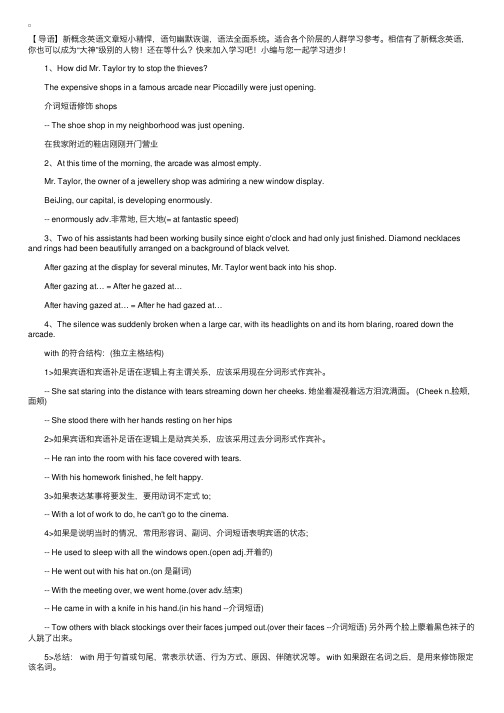
【导语】新概念英语⽂章短⼩精悍,语句幽默诙谐,语法全⾯系统。
适合各个阶层的⼈群学习参考。
相信有了新概念英语,你也可以成为“⼤神”级别的⼈物!还在等什么?快来加⼊学习吧!⼩编与您⼀起学习进步! 1、How did Mr. Taylor try to stop the thieves? The expensive shops in a famous arcade near Piccadilly were just opening. 介词短语修饰 shops -- The shoe shop in my neighborhood was just opening. 在我家附近的鞋店刚刚开门营业 2、At this time of the morning, the arcade was almost empty. Mr. Taylor, the owner of a jewellery shop was admiring a new window display. BeiJing, our capital, is developing enormously. -- enormously adv.⾮常地, 巨⼤地(= at fantastic speed) 3、Two of his assistants had been working busily since eight o'clock and had only just finished. Diamond necklaces and rings had been beautifully arranged on a background of black velvet. After gazing at the display for several minutes, Mr. Taylor went back into his shop. After gazing at… = After he gazed at… After having gazed at… = After he had gazed at… 4、The silence was suddenly broken when a large car, with its headlights on and its horn blaring, roared down the arcade. with 的符合结构:(独⽴主格结构) 1>如果宾语和宾语补⾜语在逻辑上有主谓关系,应该采⽤现在分词形式作宾补。
新概念英语第二册第6课课文详解及语法解析
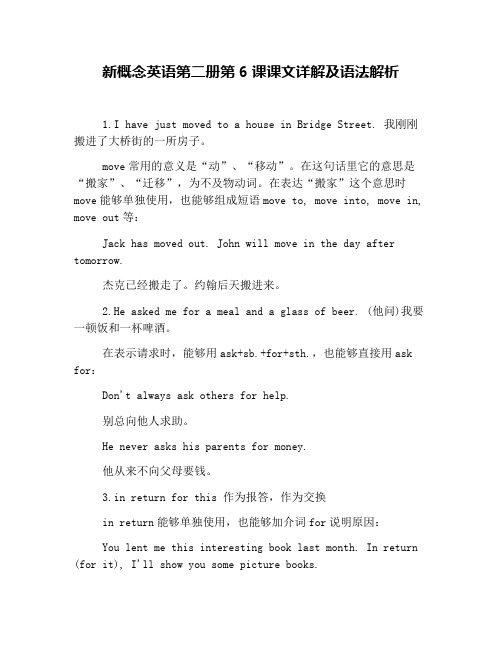
新概念英语第二册第6课课文详解及语法解析1.I have just moved to a house in Bridge Street. 我刚刚搬进了大桥街的一所房子。
move常用的意义是“动”、“移动”。
在这句话里它的意思是“搬家”、“迁移”,为不及物动词。
在表达“搬家”这个意思时move能够单独使用,也能够组成短语move to, move into, move in, move out等:Jack has moved out. John will move in the day after tomorrow.杰克已经搬走了。
约翰后天搬进来。
2.He asked me for a meal and a glass of beer. (他问)我要一顿饭和一杯啤酒。
在表示请求时,能够用ask+sb.+for+sth.,也能够直接用ask for:Don't always ask others for help.别总向他人求助。
He never asks his parents for money.他从来不向父母要钱。
3.in return for this 作为报答,作为交换in return能够单独使用,也能够加介词for说明原因:You lent me this interesting book last month. In return (for it), I'll show you some picture books.你上个月把这本有趣的书借给了我。
作为报答,我将给你看一些画册。
In return for your help, I invite you to spend the weekend with my family.你帮了我的忙。
作为回报,我邀请你与我的家人一起过这个周末。
ter a neighbour told me about him. 后来,一位邻居告诉了我他的情况。
新概念英语第二册第6课重点语法句型

第6课的内容: ⼀、重要句型或语法 1、冠词的⽤法 1)不定冠词a/an,如:a pen, an egg 2)定冠词the,如:A dog is barking at me. The dog is black and white. 3)零冠词,即不⽤冠词的情况,如⼈名和地名前⾯,如:John lives in London. 2、短语动词的⽤法 短语动词指的是后⾯跟上介词或副词后、意思会发⽣变化的动词。
如: 1)I put your book on the shelf. / I put on my hat and left the house. 2)It was very hot, so I took off my coat. / Will you look after the children for me please? ⼆、课⽂主要语⾔点 I have just moved to a house in Bridge Street. 1)注意move to表⽰搬到什么地⽅,move into表⽰搬进什么地⽅。
2)注意地名Bridge Street⾥的每个单词的⾸字母都要⼤写。
Yesterday a beggar knocked at my door. 1)beggar来源于beg(请求,祈求),表乞丐。
2)knock at表⽰敲打。
He asked me for a meal and a glass of beer. ask sb. for sth.,表⽰向某⼈提出请求或要求。
注意ask sb.表⽰询问某⼈。
In return for this, the beggar stood on his head and sang songs. 1)in return for sth.,作为对...的回报。
2)stand on one's head,表⽰倒⽴。
He ate the food and drank the beer. 1)本句为由and连接的并列句,⽽且前后结构完全⼀样,使得整句话颇有节奏感。
初一英语第六课讲解
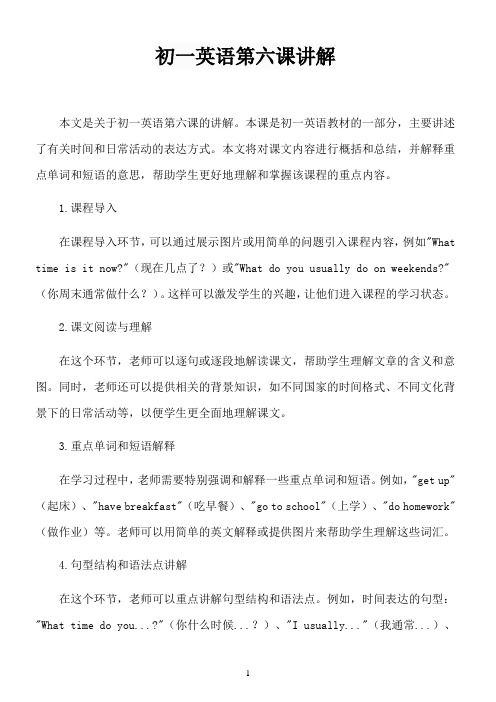
初一英语第六课讲解本文是关于初一英语第六课的讲解。
本课是初一英语教材的一部分,主要讲述了有关时间和日常活动的表达方式。
本文将对课文内容进行概括和总结,并解释重点单词和短语的意思,帮助学生更好地理解和掌握该课程的重点内容。
1.课程导入在课程导入环节,可以通过展示图片或用简单的问题引入课程内容,例如"What time is it now?"(现在几点了?)或"What do you usually do on weekends?"(你周末通常做什么?)。
这样可以激发学生的兴趣,让他们进入课程的学习状态。
2.课文阅读与理解在这个环节,老师可以逐句或逐段地解读课文,帮助学生理解文章的含义和意图。
同时,老师还可以提供相关的背景知识,如不同国家的时间格式、不同文化背景下的日常活动等,以便学生更全面地理解课文。
3.重点单词和短语解释在学习过程中,老师需要特别强调和解释一些重点单词和短语。
例如,"get up"(起床)、"have breakfast"(吃早餐)、"go to school"(上学)、"do homework"(做作业)等。
老师可以用简单的英文解释或提供图片来帮助学生理解这些词汇。
4.句型结构和语法点讲解在这个环节,老师可以重点讲解句型结构和语法点。
例如,时间表达的句型:"What time do you...?"(你什么时候...?)、"I usually..."(我通常...)、"on weekends"(在周末)等。
老师可以通过例句和练习,帮助学生熟悉和掌握这些句型和语法点。
5.对话练习与角色扮演在学习过程中,可以安排学生进行对话练习和角色扮演,巩固所学知识。
学生们可以分组或两人一组,模拟日常活动的对话情景,如询问对方的日常活动、安排活动时间等。
人教版英语七年级上册第六课解析

He is taking a long vacation this summer.
③ What country did he decide to go this time?
He decided to go to Canada this time.
2….but finally decided on Cannada. decide v. 决定,下决心 decide on + n. 决定… eg. She decided on the red shoes.
④ Why is he going to Canada?
He wanted to do sth. different this time. And he
heard that Canada is beautiful, and he know
⑤
there are many people
What places is he
Unit 6 What are you doing for vacation?
学习目标
1. 通过自主合作学习,掌握本课单词与 词组,
2.通过小组合作学习,巩固语法现在进 行时表示将来时并能熟练运用助动词 be+V+ing
3.能根据提示,复述课文
Unit 6 1.计划;规划 2.西藏 3.徒步旅行;远足 4.香港 5.多久;多长时间 6.离开,向远处 7.回来 8.发送;寄 9.明星片 10.旧金山 11.夏威夷 12.自行车 13.乘骑 14.观光,游览 15.租用;出租 16.意大利 17.去度假
4
5
3
1
2
1.Ben’s going to Greece this summer. ( F) 2. He never takes vacations in Europe.( F) 3. He’s staying in Canada for about 3 months. (T ) 4. He wants to have a great vacation. ( T)
2014秋九年级英语unit6When-was-it-invented-SectionA-B课文知识点归纳详细讲解简单
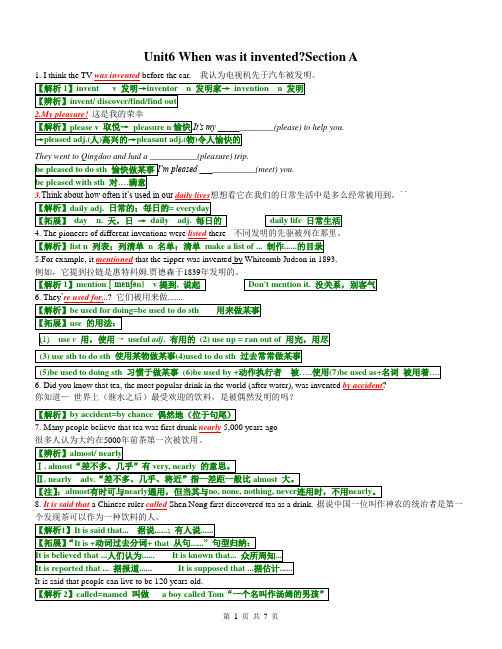
Unit6 When was it invented?Section A1. I think the TV was invented before the car. 我认为电视机先于汽车被发明。
【解析1】invent v 发明→inventor n 发明家→invention n 发明【辨析】invent/ discover/find/find out2.My pleasure!这是我的荣幸【解析】please v 取悦→pleasure n愉快.It’s my _____________(please) to help you.→pleased adj.(人)高兴的→pleasant adj.(物)令人愉快的They went to Qingdao and had a ___________(pleasure) trip.be pleased to do sth 愉快做某事I’m pleased _____________(meet) you.be pleased with sth 对….满意3.Think about how often it’s used in our daily lives想想看它在我们的日常生活中是多么经常被用到。
``【解析】daily adj. 日常的;每日的= everyday【拓展】day n. 天,日→daily adj. 每日的daily life 日常生活4. The pioneers of different inventions were listed there 不同发明的先驱被列在那里。
【解析】list n 列表;列清单n 名单;清单make a list of ... 制作......的目录5.For example, it mentioned that the zipper was invented by Whitcomb Judson in 1893.例如,它提到拉链是惠特科姆.贾德森于1839年发明的。
新概念英语第二册逐句精讲语言点第6课(3)

新概念英语第二册逐句精讲语言点第6课(3)Lesson 6 Percy Buttons课文内容:I have just moved to a house in Bridge Street. Yesterday a beggar knocked at my door. He asked me for a meal and a glass of beer. In return for this, the beggar stood on his head and sang songs. I gave him a meal. He ate the food and drank the beer. Then he put a piece of cheese in his pocket and went away. Later a neighbour told me about him. Everybody knows him. His name is Percy Buttons. He calls at every house in the street once a month and always asks for a meal and a glass of beer.精讲笔记:7.Then he put a piece of cheese in his pocket and went away.然后,他把一块奶酪放进了他的口袋里走了。
语言点1 常用表时间的承上启下的连接词和短语:first首先;second其次;third再次;later后来;then然后;later on稍后;after that在此过后;after a while过了一小会儿;some time later一段时间后;finally最终;at last终于;in the end最后语言点2 关于“一点点,一片”的表达:1)a piece ofsth.一点,一片,一件,一段2)a bit of sth.一点,一块3)a little bit of sth.一点,一则ter a neighbour told me about him.后来,一位邻居告诉了我相关这个乞丐的事情。
九年级上册英语第6课知识点
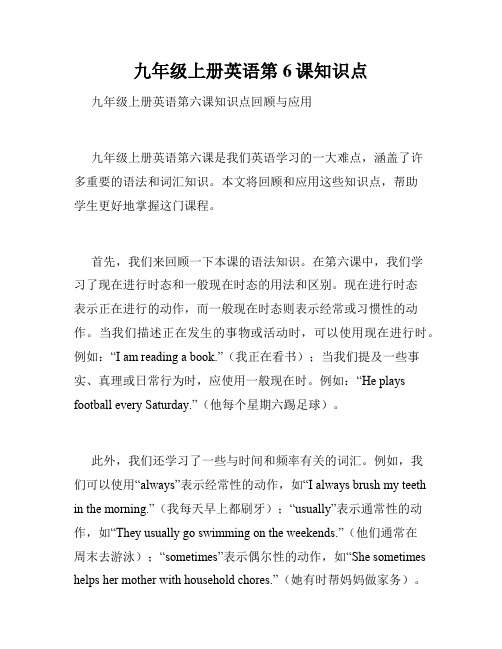
九年级上册英语第6课知识点九年级上册英语第六课知识点回顾与应用九年级上册英语第六课是我们英语学习的一大难点,涵盖了许多重要的语法和词汇知识。
本文将回顾和应用这些知识点,帮助学生更好地掌握这门课程。
首先,我们来回顾一下本课的语法知识。
在第六课中,我们学习了现在进行时态和一般现在时态的用法和区别。
现在进行时态表示正在进行的动作,而一般现在时态则表示经常或习惯性的动作。
当我们描述正在发生的事物或活动时,可以使用现在进行时。
例如:“I am reading a book.”(我正在看书);当我们提及一些事实、真理或日常行为时,应使用一般现在时。
例如:“He plays football every Saturday.”(他每个星期六踢足球)。
此外,我们还学习了一些与时间和频率有关的词汇。
例如,我们可以使用“always”表示经常性的动作,如“I always brush my teeth in the morning.”(我每天早上都刷牙);“usually”表示通常性的动作,如“They usually go swimming on the weekends.”(他们通常在周末去游泳);“sometimes”表示偶尔性的动作,如“She sometimes helps her mother with household chores.”(她有时帮妈妈做家务)。
此外,我们还学习了一些表示经验和能力的动词。
例如,“can”表示能力,如“I can play the piano.”(我会弹钢琴);“could”表示过去能力,如“When I was younger, I could speak French.”(小时候,我会说法语);“have to”表示义务或要求,如“We have to wear school uniforms.”(我们必须穿校服)。
在课堂上,同学们通过做练习题和对话练习等形式,巩固了这些知识点的应用。
- 1、下载文档前请自行甄别文档内容的完整性,平台不提供额外的编辑、内容补充、找答案等附加服务。
- 2、"仅部分预览"的文档,不可在线预览部分如存在完整性等问题,可反馈申请退款(可完整预览的文档不适用该条件!)。
- 3、如文档侵犯您的权益,请联系客服反馈,我们会尽快为您处理(人工客服工作时间:9:00-18:30)。
课文解析1. —What is Mike doing?—迈克在做什么?—He’s watching insects.—他在观察昆虫。
句中主语Mike(人名)是第三人称单数,所以动词要用is。
eg: —What is Lucy doing?—露西在做什么?—She’s catching butterflies.—她正在捉蝴蝶。
注意:he’s是he is 的缩写形式。
2. —Are they eating honey?—它们在吃蜂蜜吗?—Yes, they are.—是的,它们在吃。
Are they...? 意思为“它们在(做)……吗?”是进行时态的一般疑问句。
肯定回答:Yes, they are.否定回答:No, they aren’t.eg: —Are they climbing trees?—它们正在爬树吗?—No, they aren’t.—不,它们不是。
3. —Is John playing chess, too?—约翰也在下棋吗?—Yes, he is.—是的,他也在下棋。
本句是以is开头的一般疑问句,用yes或no来回答。
注意答句的人称要与问句相对应。
—eg 1: Is he eating lunch now?—她正在吃午饭吗?—Yes, he is. /No, he isn’t. —是的,他是。
/不,他不是。
eg 2: —Is the kangaroo jumping?—那只袋鼠正在跳吗?—Yes, it is. /No, it isn’t. —是的,它是。
/不,它不是。
eg 3: —Is Alice watching insects now?—艾丽斯正在观察昆虫吗?—Yes, she is./ No, she isn’t.—是的,她是。
/不,它不是。
4. —Is she counting insects?—她在数昆虫吗?—No, she isn’t.—不,她不是。
本句中, count insects为数昆虫的意思.eg 1: John is counting insects.约翰正在数昆虫。
拓展: count为动词,表示“数;计数”。
count的-ing形式:countingeg 2: Can you count from 1 to 1000? 你能从一数到一千吗?注意:count中字母组合ou发[au],类似还有: cloudy (多云的),mountain(山)词汇学习1. take pictures(照相)eg: —Are they taking pictures?—他们在照相吗?—Yes, they are.—是的,他们是。
拓展:take的–ing 形式: taking(去e加ing)同义词组:take photos 联想:take off脱衣服 take a look at看一看2. watch insects(观察昆虫)eg 1: —Are you watching insects?—你正在观察昆虫吗?—Yea, I am.—是的,我是。
拓展:watch可以作动词,意思为“看;观察”。
还可以作名词,表示“手表”。
eg 2: watch TV 看电视eg 3: I have a new watch.我有一块新手表。
联想:watch out 当心;小心3. pick up leaves(采摘树叶)eg 1: —What is he doing?—他正在做什么?—He is picking up leaves.—他正在采摘树叶。
拓展:pick为动词,意思为“采摘,采集”。
pick 的–ing形式:pickingeg 2: pick up mushrooms采摘蘑菇eg 3: pick flowers采摘花朵4. do an experiment(做实验)eg: The students are doing an experiment.学生们正在做实验。
联想:以do开头的短语还有:do morning exercises 做早操do sports做运动 do the dishes洗碗碟do homework 做作业注意:experiment 以元音因素开头,所以前面要用an。
5. catch butterfly(捉蝴蝶)eg 1: We are catching butterflies. 我们正在捉蝴蝶。
拓展:catch为动词,意思为“捉住,抓住”。
catch的-ing形式:catchingeg 2: catch the ball接球。
助记:butterfly (蝴蝶)变复数:变y为i 加es。
联想: catch dragonflies捉蜻蜓6. in the woods在树林里eg: The tiger is running in the woods.那只老虎正在树林里奔跑。
联想:in the forest 在树林里 in the tree在树上7. collect leaves(收集树叶)eg: Collecting leaves is his hobby.收集树叶是他的爱好。
拓展:collect为动词,表示“收集”。
collect的-ing形式:collectingcollect stamps集邮8. write a report(写报告)eg: —Are you writing a report?—你正在写报告吗?—No, I’m not.—不,我没有。
拓展:本词组的-ing形式:writing a report正在写报告 (write去e,再加ing)联想:write a letter写信 write an e-mail 写电子邮件9. play chess(下棋)—Are the twins playing chess?—那对双胞胎正在下棋吗?—Yes, they are.—是的,他们是。
联想:play sports进行体育活动play the piano弹钢琴play computer games玩电脑游戏10. have a picnic(举行野餐)—What are they doing?—他们正在做什么?—They are having a picnic.—他们正在举行野餐。
联想:have开头的短语还有:have a look看一看 have an English class 上英语课have breakfast 吃早餐11. honey(蜂蜜)eg: My sister likes eating the honey.我姐姐喜欢吃蜂蜜。
语法学习现在进行时的一般疑问句Ⅰ. 现在进行时的一般疑问句是把动词be,即:am, is, are提前。
句型相应be动词 + 主语 + 现在分词+ ……?eg. Are you dancing? 他们正在跳舞吗?Is he drawing a picture? 他正在画一张画吗?Are you talking with your friend? 你正和你的朋友谈话吗?Ⅱ.现在进行一般疑问句的答语句型:(1)肯定回答:Yes, 主语 + 相应be动词。
(2)否定回答:No, 主语 + 相应be动词 + not。
eg. Are you listening to the music? Yes, I am. / No, I am not. 你正在听音乐吗?是的,我正在听。
/ 不,我没在听。
Is Aunt Wang knitting a sweater? No, she isn‘t. 王阿姨正织毛衣吗?不,她没有。
一.按要求改写句子1. The boy is playing basketball.否定句:____________________________一般疑问句:_________________________肯定回答:__________________________否定回答:__________________________对"is playing basketball"提问:__________________________对" The boy"提问:__________________________2. They are singing in the classroom.否定句:____________________________一般疑问句:_________________________肯定回答:__________________________否定回答:__________________________对"are singing "提问:__________________________对" in the classroom"提问:__________________________3. She, the window, open, now.(用现在进行时连词成句.)_____________________4. The birds are singing in the tree.(就划线部分提问)________________________5. is,who,the window, cleaning?(连词成句)______________________6. She is closing the door now.(改成否定句)______________________7. they, the tree, sing, now, under.(用现在进行时连词成句.)_____________________8. The Young Pioneers are helping the old woman.(改成一般疑问句) ______________________二..用现在进行时完成下列句子:1._you_(play)tennis2._your friends_(live)near here3.what_he_(do)4._they_(go)to school every day?Yes, they ./No, they_ .5.______you__________(fly) a kite? Yes, _______.6.______she___________(sit) in the boat?7.______you_____________(ask) questions?8. We_______________(play) games now.参考答案:一.1. The boy isn't playing basketball.Is the boy playing basketball?Yes, he is.No, he isn't.What is the boy doing?Who is playing the basketball?2. They aren't singing in the classroom.Are they singing in the classroom?Yes, they are.No, they aren't.What are they doing?Where are they singing?3. She is opening the window now.4. What are the birds doing in the tree?5. Who is cleaning the window?6. She isn't closing the door now.7. They are singing under the tree now.8. Are the Young Pioneers helping the old woman?二.1. Are playing 2. Are living 3.is doing 4.Are going5. are aren't6.Is; sitting7. Are; asking 8. are playing。
